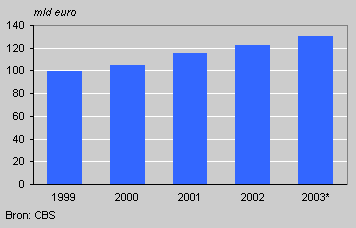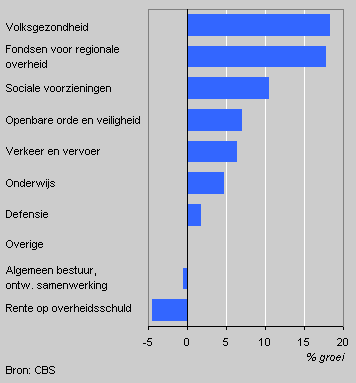Government spending grows steadily

In 2003 government expenditure amounted to 130.7 billion euro, a rise of 6.4 percent on 2002. The increase in government expenditure almost equalled the previous year.
From 1999 government expenditure grew by 6 to 7 percent annually, with the exception of 2001 when the rise was significantly higher. The non-recurrent lump sum payment for the take-over of profit claims resulted in a rise in government spending by 9.7 percent in 2002. In the period 1999-2003, GDP showed an annual average growth rate of 5 percent. This caused the share of government expenditure in GDP to rise from 26.6 percent in 1999 to almost 29 percent in 2003.
Government expenditure, 1999-2003

Social provisions account for one fifth of government expenditure
The largest amount, 25.4 billion euro, was spent on social provisions, immediately followed by education accounting for 23.4 billion euro.
Government expenditure per policy area, 2003

Strong increase in public health expenditure
The costs of health care rose sharply, by over 18 percent to 7.9 billion euro, almost entirely caused by the financial compensation the government paid to the fund for the Exceptional Medical Expenses Act. The introduction of the new tax system in 2001 was largely accountable for insufficient premium proceeds.
More money available for social provisions
Government spending on social provisions involved an extra 2.4 billion euro mainly to provide financial assistance to elderly persons and surviving relatives. Young persons with mental or physical disabilities, persons on income support and asylum-seekers also received extra money.
Government expenditure per policy area, 2003

Costs of interest paid continue to fall
Interest paid on the national debt decreased by 0.5 billion euro to 10.8 billion euro. It fell for the fifth consecutive year, partly because the amount borrowed by the government in 2000 was relatively low. Thus the amount of interest to be repaid in later years will also be lower. In recent years high interest loans were converted into low interest loans and long-term loans into cheaper short-term loans. In addition,, the public sector benefited from significantly lower interest rates on the capital market in 2002 and 2003.
New fund for VAT compensation
Local government funds include expenses for the Municipal and Provincial Budget Funds and the VAT Compensation Fund. These expenses rose by 2.5 billion euro. The increase is chiefly caused by the introduction of the VAT Compensation Fund which received 1.6 billion euro.
Fred Arkesteijn